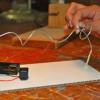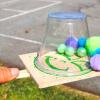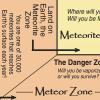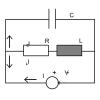Search Results
Showing results 1 to 13 of 13

Circuit Game
Source Institutions
In this activity, learners build a game that tests their steadiness. Learners construct the game board by setting up an electrical circuit and a wand.

Marble Game
Source Institutions
In this activity, learners construct a simple game to test their hand-eye coordination and steadiness of hand.

Whose Fault Is It?
Source Institutions
In this seismic simulation, learners play a "who-dunnit" game to explore earthquakes.

Building Bingo
Source Institutions
In this on site "field trip" activity (located on pages 6-9 of PDF), learners get hands-on experience identifying building materials by playing "Building Bingo".

Caller ID: The Frog - and Toad! - Mating Game
Source Institutions
This activity is a sensory experience that recreates the sounds of a pond at night.

Space Rocks!: A Meteorite Game
Source Institutions
In this board game, learners explore the origins of meteors, meteoroids, and meteorites as well as the their characteristics and importance. They also discover some misconceptions about meteors.

Marble Drop Game
Source Institutions
Build your own version of a favorite carnival game, in which a marble races down a maze consisting of rows of nails.

Paper Drop Design Competition
Source Institutions
Using paper, paper clips, an index card, and tape, teams of learners design flying devices to (1) stay in the air as long as possible and (2) land as close as possible to a given target.

Mission: Control!
Source Institutions
In this activity and game, learners will train to improve balance and spatial awareness by performing throwing and catching techniques on one foot.

Exploring Fabrication: Self-Assembly
Source Institutions
In this activity, learners participate in several full-body interactive games to model the process of self-assembly in nature and nanotechnology.

Zoo Calendar
Source Institutions
Use the Zoo Calendar (page 1 of PDF) to involve learners in interdisciplinary, whole language, and writing activities about ecological concepts.

Wire Maze
Source Institutions
Learners create an electrical-circuit maze out of wire, then try to pass a paperclip through the maze without touching the wire.

Self-Assembly Game
Source Institutions
This is a quick game about self-assembly (page 2 of PDF under Self-Assembly Activity). Like the molecules of DNA, learners will self-assemble into a pattern by following a simple set of rules.
